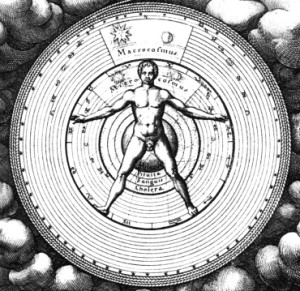
“If I had not made magic my constant study I could not have written a single line…The mystical life is the centre of all that I do and all that I think and all that I write.”
–Yeats writing to his friend, Thomas Moore, in 1925
Abundant images of the Sun and Moon in his poetry reflect Yeats’ role as a mystic and astrologer, while pointing to a more complex interpretation of the role Celtic Astrology plays in Yeats’ juxtaposition of cosmological meaning and Irish nationalism. In his poem “The Man who dreamed of Faeryland”, Yeats conjures a whimsical portrayal of the Irish essence, suggesting that there is an intrinsic Celtic nature in the modern Irish man by underlining it with descriptions of “a gay, exulting, gentle race / under the golden or the silver skies” (20-21). In line 23 of the same poem as well as in the last two lines of “The Song of Wandering Aengus” the sun and moon indicate Yeats desire to draw from their astrological significance and underpin his belief that human beings are born with an essence that is proven in the stars. Searching for this ancient, true, Ireland, Yeats’ speaker in “The Song of Wandering Aengus” vows to “walk among long dappled grass, / And pluck till time and times are done / The silver apples of the moon, / The golden apples of the sun” (21-24). The sun and the moon act dually as icons of nature in a spiritual sense and a scientific sense, for they hold a mystical power that is “an unexplained rule of thumb that somehow explained the world” (Mann 4) and can be mapped out through means of studying astrology. Reminiscent of the zodiac, which, as we know, is based on a combination of the moon phases and the Sun’s movement throughout the year, Yeats incorporates astrological symbolism in his illustration of Irish identity in order to suggest that there is a parallel between the distinct Celtic element that encompasses the Irish race and the 12 signs delineating humanity into essential characteristics. Yeats presents this conviction that the universe is “symbolical of the personal spiritual life” (Mann) in “He wishes his Beloved were Dead” where the lines “But know your hair was bound and wound / About the stars and moon and sun” illuminate the notion that Ireland’s identity is a fundamental constitution of the mind and soul that is traceable through ancient sources.
Mann, Neil. “Astrology.” W. B. Yeats and “A Vision”:. Clemson University Digital Press, 2012. Web. 04 Feb. 2014.
Mann, Neil, Gibson, Matthew, and Nally, Claire V. “W.B. Yeats’s A Vision Explications and Contexts”. Clemson University Digital Press. 2012. Web. 04 Feb 2014.
